Homilies by Revd George Kingsnorth (Deacon)
Shortly after being ordained as a Permanent Deacon, a fellow Deacon and Creative encouraged me to turn my homilies into videos and to publish them every week. Now another friend has suggested I turn the current 75 x approx 5 minute videos in a series of post casts. So here they are. I hope you find them useful.
Episodes
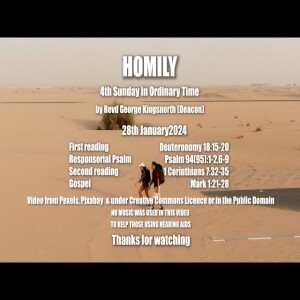
Saturday Jan 27, 2024
Homily - 4th Sunday in Ordinary Time - Sunday 28th January 2024 – Year B
Saturday Jan 27, 2024
Saturday Jan 27, 2024
Homily4th Sunday in Ordinary TimeSunday 28th January 2024 – Year BThe theme from today’s readings is about the authority of Jesus as the Word of God. What he says provides a whole new teaching to the people of Capernaum. They had not seen this before in their scribes and priests. They even witnessed it when Jesus ordered the unclean spirits to leave the man, without saying who Jesus is. The unclean spirits knew exactly who Jesus was and feared he would destroy them; they recognised that Jesus is the Holy One of God and that they had to obey his every word. There were consequences for not doing so.Psalm 94 reminds us to listen to the voice of God and not to harden our hearts as the Israelites had done at Massah and Meribah. For forty years the Israelites had travelled through the desert known as the Wilderness of Sin. Everyday God had provided them with manna. God had promised that if they followed his Words and did as he said, the people would be looked after and would never be inflicted the same as the Egyptians. Each day they were provided for, and on the sixth day they received double the amount so they could rest on the Sabbath. However, some people went out to collect more, disobeying God. When the Israelites neared Rephidim the manna stopped, and the people complained because they found no water. They quarrelled with Moses, even threatening to stone him, questioning whether God was with them. The Lord said to Moses to take the rod used to help the Israelites escape from Egyptians, through the sea, and use it to strike the rock at the base of Mount Horeb. When he did water flowed out to quench the Israelite’s thirst. However, Moses in his zeal struck the rock twice, instead of once. God felt Moses did not trust him enough, and this action meant Moses was not allowed to lead the Israelites into Canaan. The place was called Massah because the people tested God, and Meribah because they quarrelled with Moses.On Mount Horeb, Moses had been called when God appeared in a burning bush. Again, a short time after providing water from the rock at the base of Mount Horeb, God called Moses up the mountain, also known as Mount Sinai, to receive the Ten Commandments. While he was away, the people lost faith, carved idols and worshipped false gods, frustrating Moses when he returned. God had shown them the way that their lives would not be full of anxieties and stress. All they had to do was to devote themselves to the Lord.Moses destroyed the first set of tablets as the people had sinned against God, but Moses asked for them to be forgiven. The Lord told Moses, the people’s sins prevented him from being among them, as his presence would annihilate them. Moses set up a Tent of Meeting outside the Israelite camp so he could consult with God. Each time Moses entered the tent, the people could see a Pillar of Smoke come down. Moses had the Lord’s favour and asked to see his Glory. He was led up Mount Horeb, to a place where God could shield Moses with his hands as his glory went by and Moses would remain alive. God renewed the Covenant with Moses, and when he descended the sacred Mountain, all the Israelite saw the radiance of Moses skin and were afraid. In Deuteronomy, Moses reminded the Israelites that when they entered the promise land, they must not follow the practices of the people who lived there, who sacrificed their children, consulted mediums, and other things detestable to God. The Lord promised the Israelites a leader from their own people who would proclaim the Word of God. This prophecy also tells how God will be with His people, and through this person he will speak to them. They are told to listen to what he has to say to be saved.Jesus is the embodiment of the Word. God made flesh who lived among us. Though we are all sinners, it is through God’s grace, a gift freely given that we are cleansed through the blood of Christ. The Gospel of Mark witnesses the authority Jesus had been given, who could command unclean spirits and they would obey. St. Paul, who we celebrated his conversion last Thursday 25th January, had originally persecuted the church, but when he saw Jesus on the road to Damascus, he turned his whole way of life around to simply follow Jesus and believed. This was only possible through God’s grace given to him. In his first letter to the Corinthians, Paul encourages us to devote our lives to the Lord, whether we are married or single, and not be worried by the affairs of this world. And like Moses we will be shielded from what can be destructive in our lives. Today, we are encouraged to listen to Our Lord’s voice, and not harden our hearts. Amen.
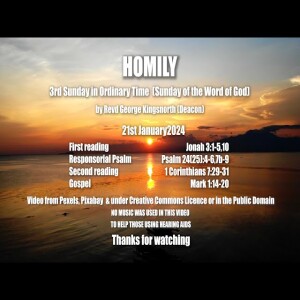
Saturday Jan 20, 2024
Saturday Jan 20, 2024
Homily3rd Sunday in Ordinary Time (Sunday of the Word of God)Sunday 21st January 2021.The theme today is about change and making choices about which way to go. Change is a funny thing because often we humans don’t like change. We get comfortable in what we have, and grumble when there comes an upheaval. But change is part of our lives, right from the moment of birth, when we take our first breath. We have been alive for forty weeks in our mother’s womb, then we find all the sounds change, light floods into our eyes, and we feel the coldness of air on our skins for the first time. No wonder we want to cry. Yet, none of us will remember this event. We may hear the stories our parents tell us, especially our mothers, but their lives have changed too. Massively so. Yes, they’ve had nine months or so to get used to the idea, and Mum has seen changes virtually every day of her pregnancy. There is anticipation, anxiety, and worry about how the new arrival will affect her life and dad’s. Can they live on a single income if one of them stops working to look after the child? Who should it be, mum or dad? That decision is not easy. There are all kinds of psychological changes that must be made. Depending on how the birth goes, the change can be too much for mum, leaving her with depression and perhaps physical disabilities. For previous generations, extended family most likely lived close by, or a short car journey away. Support could be easily found. Yet today young families are often forced to leave the areas they grew up in, away from grandparents and siblings. Some may have had to emigrate to find work for their skillset, that will allow them to provide for their family, but the networks of support have been broken.Other families, with teenagers, may find the main breadwinner is forced into redundancy, creating an upheaval for the family. Perhaps they must move, forcing the kids to change schools, or the other parent having to find new work. All change. The children may have all gone off to college, or university, or simply found a good job and they can pay their own way. Mum and dad may seem to have some time to themselves, then changes in their parent’s circumstances, such as through death and the other not coping on their own, means another person to be looked after. Creating a new dynamic that changes the family home.Or perhaps, the couple find the fledgelings have flown from home, thinking they finally have some time to themselves, and discover one is ill and needs care. A change that affects both lives and can be emotionally draining. How do they cope?Jonah panicked when God first told him to go to Nineveh. He ran in the opposite direction, found a ship and left the country. He didn’t want to face the people of Nineveh; he knew how wicked they were. He’d be killed. He wanted none of that. But his way, the one he chose, was more difficult. The sailor discovered his actions had caused the storm that threatened to shipwreck them, so Jonah was thrown overboard. Then he was swallowed by a great fish. Jonah spent three days and nights in its belly, then is thrown out on the dry land, after the Lord had directed the fish.By trusting in God and following his way, Jonah delivered God’s message to the people of Nineveh about their imminent destruction. They did not kill Jonah but repented, fasted and put on sackcloth. God saw how they responded and relented. The disaster did not happen.Paul tells us our world is changing and time is short. Our normal behaviours must change because what we know will pass away. The messengers of fear drill into us what is happening on this planet daily. Our governments blame the people, and we blame them for things that are going wrong. It’s everyone else’s fault. The Good News Jesus proclaimed is “the time has come, and the kingdom of God is close at hand. Repent, and believe the Good News”. The changes we must make is to stop trying to fix things ourselves, stop trying to be in control, because we are not, and turn to God, repent and be forgiven.The fishermen were fixing their nets, but when they saw Jesus and he asked them to follow him, they dropped everything and did as he said. In today’s Gospel, Mark tells us about Simon Peter, Andrew, James and John being called. Then in Chp 3 all twelve are mentioned, including Andrew, Philip, Bartholomew, Matthew, Thomas, the second James, Thaddaeus, Simon the Canaanean and Judas Iscariot. Each, when called, dropped everything and followed Jesus, changing their lives. Though we may struggle, if we constantly try to take control, as Jonah did, disaster will follow, but if we can have a change of heart, to allow God to make known to us his ways, we will find peace. If we continue to worry about how to solve our lives, we will be tormented, but by following Jesus our burdens will be light. He will take the load and what we fear will be taken away. The kingdom of God is close at hand: repent and believe the Good News. Amen.
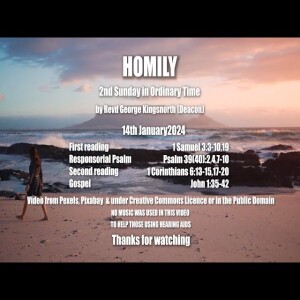
Saturday Jan 13, 2024
Homily 2nd Sunday in Ordinary Time – B Sunday 14th January 2024
Saturday Jan 13, 2024
Saturday Jan 13, 2024
Homily2nd Sunday in Ordinary Time – BSunday 14th January 2024Through Advent, we were encouraged to prepare ourselves for the coming of Jesus at Christmas and to anticipate his Second Coming. Over the past few weeks, we were also reminded of how John the Baptist was sent to prepare the way for the one he was unfit to untie his sandals. Yet when he met Jesus, he recognised him instantly and said, “I need to be baptised by you”. However, Jesus replied, “Leave it for the time being; for it is fitting that we should fulfil all righteousness.” John baptised Jesus, and the spirit of God rested on him in the form of a dove. Jesus did not need to be baptised as he was sinless. Being baptised he became a sign to John the Baptist. Jesus was humbling himself to be like us but without sin. His righteousness enables us to be fully forgiven. Our Baptism enables Christ to regenerate us into children of God. We are also united with Christ, and through his Crucifixion we die to sin, transformed both physically and spiritually. Baptism placed an indelible mark upon us that cannot be taken away. We belong to God.It was the following day when John was with two of his disciples, including Andrew. John saw Jesus and proclaimed; “Look, there is the Lamb of God”, and the two disciples followed Jesus, spending the rest of the day with him. What Andrew learnt inspired him to race to his brother Peter, to share the Good News that the Messiah had been found.No sooner does Simon Peter meet Jesus and he is renamed Cephas, the Rock on which Jesus’s church will be built. Peter, as we know from the Gospels, had his flaws. He was hasty in his responses to Jesus, even at one time being called Satan by his friend, who told him to get behind him. Then having said he would never abandon his friend and would die for him, Peter did exactly the opposite, letting Jesus down by denying him. Jesus knew this and forgave him.Before Jesus ascended, he met with his disciples on the Shore of Tiberias. They finished breakfast and Jesus turned to Peter and three times asked him if he loved Jesus more than anyone else? Peter was surprised and insisted he did. Jesus instructed Peter the first time to feed his Lambs, then to look after them, and then to feed his Sheep.We are seeing the formation of the church begin in those exchanges between Jesus and Peter. The Rock being the foundation. The church is the body of Christ. We are encouraged to think of our bodies as temples of the Holy Spirit, which is why Paul’s first letter to the Corinthians challenges them to stay away from anything that is impure. Our bodies are sacred. We are one with Christ. Paul highlights that it is not possible to join the corrupted to the incorruptible. If we do, we are ourselves cutting ourselves off from God, through our choices. We have free will, regardless of what this world tries to convince us of. Like Samuel, we need to listen and discern who is calling us. If we listen to what we hear in Mass, or when we read the words from the Bible, or explore what it is that our Christian Tradition is ‘actually’ about we will be able to see, hear and feel the way to God. Our spirits will recognise the call we are getting. What we must do is pray for the Holy Spirit’s guidance to prevent the devil’s lies from distracting us. We need to cut down on the influence of social media, television, newspapers and other media outlets that are easily accessible but often wrapped up in deceit, creating a fog in front of us that is hard to see the truth of what is happening, or a hissing noise that needs to be filtered out so we can hear more clearly. We also need to be able to calm our nerves so as our emotions don’t get stirred up, making us angry or wanting to lash out because of the way all our senses are being overloaded with so much information. We need to learn to rest. To do, as Samuel was asked, to lay down in our place, a quiet place so we can hear when the Lord is calling to us. We still need to prepare, for when the Lord calls, like Samuel and Andrew, we need to be able to let go of our worldly concerns and follow Jesus.
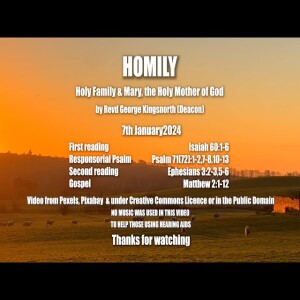
Friday Jan 05, 2024
Homily - The Epiphany of the Lord 6th January 2024
Friday Jan 05, 2024
Friday Jan 05, 2024
HomilyThe Epiphany of the Lord6th January 2024What is the Epiphany? We know biblically three wise men came from the east to pay homage to the Saviour. Epiphany is described by some as the manifestation of God appearing as the baby Jesus, and the world being made aware of this. When Herod heard the news, he was worried that his kingdom was about to be usurped. Fear drove him to persecute the children of Bethlehem when the wise men failed to return to him with details of his location. In Matthew’s Gospel, the wise men are warned in a dream not to return to Herod but to go home a different route.Paul tells the Ephesians he has been sent to bring the Good News to the pagans, because they also inherit the promise given to the Jews. All of humanity is given the same promise as we are parts of the same body. Paul initially persecuted Christianity, wrongly believing that only the Jews had been chosen to be saved. The Glory of God though rising in Jerusalem, is calling to all of us.Jesus wants to be our saviour and is calling us to follow him, just as he did the disciples. Each of the twelve were in the middle of their regular day, some fishing, others collecting taxes and so on. But once they heard the message, their world changed. The disciples knew they had to drop everything and follow Jesus. We all have a story of how Jesus called us. This can happen many times. Samuel, as a boy, heard someone call. He ran to Eli and shouted, “Here I am”. Initially, the boy Samuel thought it was Eli, but the old man realised it was God calling the child.Is God calling you? Many of us were brought into Christianity by our parents, who followed the traditions of their church. They ensured their children were baptised as babies. Later, in school, the children were encouraged to go to confession, receive communion, and then later to be confirmed.My parents did the same for me. However, going to church was disrupted as we moved to different villages. At the age of nine, we moved to Yardley Hastings, in Northamptonshire. I went to a Church of England Primary School and enjoyed the assemblies because of the stories about Jesus. My sister and I started to attend Sunday School. After two years we began to prepare for Confirmation. I had lots of questions, and worried about forgetting the creed. As I walked towards the bishop, my mind was dizzy with concerns. Then within me, I sensed someone say, “Don’t worry, you’ll be okay next time”. I thought this strange as you only get confirmed once. In my twenties, I was confirmed a second time, a year after being accepted into the Catholic Church. After moving to Dromintee, and living there for a few years, work suddenly became scarce. About twenty years ago, I commuted to Birmingham to teach media production at a university. My sister and her friend heard about an Alpha Course being run near their home. They were nervous about going, so I said I would join them. Those attending were from various denominations and none. Nothing was forced on anyone, the sessions were basically opportunities for everyone to discuss in a safe place what they knew about Christianity, if at all. The format was simple, we were greeted at the hall door, given a meal and had a chat with those who were there. Once the meal was over, we watched a video talk, which lasted around twenty minutes, and then we had time for a discussion. Everyone was encouraged to contribute and have their say. There was no wrong or right answer, but the questions were encouraged to open discussion. This was a chance to explore Christianity, from our perspectives. These were not lectures but discussions facilitated by the leader. The first week posed the question “Is there more to life than this?” I’m sure at times all of us have asked this question. It is part of our search for meaning in life. The second week we were asked, “who is Jesus?” This was a good discussion because many of us had different ideas about Jesus. We all learnt something new.Over the past two decades, I have attended seven Alpha Courses, and have discovered something new in each one. Jesus is calling me again but this time to run a course. It’s a bit nerve-wracking as it is hard to know what to expect. Then again, like at my first confirmation, I am being told not to worry. It’s not up to me, and that’s the exciting thing.Our first session will be on Thursday 15th February 2024, in the Parish Hall in Jonesborough, at 7.30pm. If you would like to explore what Christianity is about, why not join me on this initial eleven-week journey. Just come along to the first night to see what happens. If you don’t want to go on your own, bring a friend. Your experience is just as meaningful as everyone else’s, and we’d love to hear what you have to say.
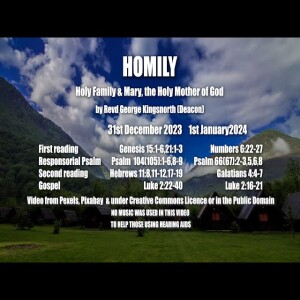
Thursday Dec 28, 2023
Thursday Dec 28, 2023
HomilyHoly Family & Mary, the Holy Mother of God31st December 2023 & 1st January 2024This weekend the theme is about keeping faith and trusting in the Lord. God is asking us to have no fear as he is our shield. He will protect us and by having faith in him we will be rewarded.This time of year should be a time of celebration as we remember how Our Lord humbled himself to come into this world and to share the experiences we have as human beings. His mother was prepared to receive Our Lord as a purified vessel, without sin, to be able to carry such a blessed being. As she visited her cousin Elizabeth, the child, who would be called John, leapt in his mother’s womb at the sound of Mary’s voice. Elizabeth called Mary and her child blessed and was astounded that the mother of our Lord had come to visit her. Mary proclaimed how great the lord is and how her spirit rejoiced in God our saviour. How all generations would call her blessed, because of the favours God had given to such a lowly person. As she finished, what we now call The Magnificat, she remembered God’s mercy and the promise made to Abraham and his descendants forever.After John’s birth, he was taken by Elizabeth and her husband, Zechariah, to be circumcised. Zechariah had been without his voice since he had been visited by an angel who told him his wife would bear a child, even in her old age, and the child would be filled with the Holy Spirit. Zechariah had doubted this and lost his voice. When he was asked what the child’s name should be, his voice came back, and he said John.Being filled with the Holy Spirit, Zechariah gave a prophecy about his son and blessed the Lord. He said how God had established a saving power, through the House of David, as promised to Abraham. How we will all be freed from fear, especially from our enemies. His son, John, would prepare the way. Today, what Zechariah said, we call The Benedictus. All this can be found in the first chapter of the Gospel of Luke.In Matthew’s Gospel, Joseph was also visited by an Angel, who told him not the fear marrying Mary, even though she was pregnant, as the child was conceived through the Holy Spirit, and that his name would be Jesus. Mary had been told the same by the Angel Gabriel before Jesus’s conception. Eight days after his birth, Jesus was given his name by his parents on the day of his circumcision. When Jesus’s parents brought him to the temple to present him to the Lord, in accordance with the Jewish tradition that all first-born males must be consecrated to the Lord, two people were waiting to see the Lord in person. The Holy Spirit rested on Simeon, and he blessed Jesus, as he had been told he would not die until he saw his Saviour. The 84-year-old prophetess, Anna, who had devoted her life to God, also was filled with the Holy Spirit and was able to praise God and tell everyone about the child.In our own lives, especially when things seem to be hard, we are encouraged to have faith and trust in God to bring us through. We live in troubled times, with much confusion. We hear stories that challenge our beliefs. For some, what they hear may influence them to consider leaving the church, but who does this benefit? Jesus said in Luke’s Gospel “every kingdom divided against itself is laid waste”. He was referring to the accusations that he was casting out demons through the power of Satan. In this day and age, is it not the wish of Satan to divide God’s people in the hope that we will fall away from God. Therefore, we too are encouraged not to be fearful, but to trust in Our Lord, because he will be our shield against the deceptions and lies promoted by the Devil’s hand.If we find that our pride is getting the better of us, when disputes arise within our homes, it is better to hold our tongue, as the words we say may cause more destruction. It is better to hold our peace especially when we feel hurt. By showing love and patience, we can bring our families closer together. In Joseph and Mary’s relationship, in the early stages, there was much that could have driven them apart. Their society endorsed such actions as divorce and would have judged a young woman pregnant outside of marriage as sinful. Yet, both Mary and Joseph were asked to trust and have no fear, that they were following God’s plan.If the urge within us is to run away and reject what God has to offer us because we think that independently we can make things better, then all we need to do is look around ourselves at how the world is going. Now more than ever we need to trust in Our Lord and God, he will be our shield and his blessings will be upon us.We are a family, we are the church, everyone of us. All we are asked to do is to accept that Jesus came into this world to die for us on a cross, three days later he rose again from the dead, cleansing us from our sins with the blood and water that flowed from his side. He is our Saviour and by our faith, we are blessed.
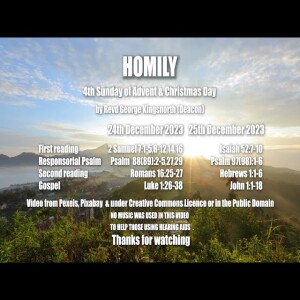
Saturday Dec 23, 2023
Homily - 4th Sunday of Advent & Christmas Day - 24th & 25th December 2023
Saturday Dec 23, 2023
Saturday Dec 23, 2023
Homily4th Sunday of Advent & Christmas Day24th & 25th December 2023The night before writing this homily, my mind was very active going over ideas for what to write. What came into my head were thoughts of how we humans have a voice and how prayers need to be spoken as part of a group to give praise to God the father.I was thinking of how stories in the Bible often foreshadowed various situation to set up prophesy for future events, such as Isaiah telling King Ahaz that a virgin would give birth to a child who would be called Emmanuel, which means ‘God is with us’.In the reading from Luke for Christmas Eve, the Angel Gabriel visits the Virgin Mary to tell her she will conceive a child, through the power of the Holy Spirit, and that she must name him Jesus – which means ‘God saves’.Christmas Day's gospel is from the start of John which says, ‘in the beginning was the Word: the Word was with God and the Word was God. Everything was created through him and without him nothing could be’. We are also told about Jesus’s cousin John and how he was a voice in the wilderness preparing the way. In the early hours, my mind churned over how words are so important in our lives. They can be used for good or bad. Words can cut through someone like a sword straight to the heart. We can be injured by words just as easily as we can be raised up and encouraged.Why do we always fall towards the negative, by either putting other people down or ourselves? In counselling this is called automatic negative thoughts but where do they come from? What is the influence that makes us see catastrophes everywhere?These are important questions because they inform us that we all have these thoughts and if we follow science with cause and effect or that energy cannot be created or lost so it is always there just transforming from one thing to another, we should be able to track where it came from and where it is going.Biblically we talk about temptation. From the Lord’s prayer we ask God to guide us away from temptation. Temptation is the desire to do something, especially something wrong and unwise. Jesus was tempted by the devil in the desert but resisted. Unfortunately, in everyday life we are tempted, especially through the media, we are bombarded by adverts to spend our money on one thing or another. We are encouraged to get the latest thing, even if we have no real use for it.In Ian Fleming’s book The Spy Who Loved Me, the story is about a young woman called Vivianne Mitchell, a runaway who is given a job at a hotel far away from her family, owned by two dubious characters who are about to carry out an insurance fraud to claim money by having the hotel burnt down. Vivianne is being set up to get the blame, but also would die in the arson attack. It is James Bond who saves her by chance. He has a small role in the story.Some of the details in the story include how honeymooners staying at the hotel would rob the furniture in their rooms, because they could not afford to buy it themselves and this was why the hotel was failing.Nowadays, young couples expect to have everything in their homes right from the start, putting themselves into debt. Whereas the previous generations would have spent a lifetime building up their homes into what they had dreamed of when young.All this leads to us desiring a life that often is beyond our means because the way we are being influenced by society around us.Proverbs 23: 4 to 5 says don't wear yourself out to get rich; because you know better, stop! As soon as your eyes fly to it, it disappears, for it makes wings for itself and flies like an eagle to the sky.What are we being tempted away from? The answer is God. Why? Because the devil was jealous that God chose Mary to be the mother of his son Jesus and her beauty out shone his own, as the Angel of Light. For this reason, in the Book of Revelations the dragon waited for the woman, crowned with twelve stars and the moon at her feet, to give birth to her son, but the child, who would be the shepherd of all nations was taken to heaven and the angels took the woman to safety.What we today are encouraged to do is to give praise to God the Father for all our blessings and to turn away from our selfish ways. Jesus came into the world to surrender all to God the Father, to take on our sins, even though we are not worthy. Jesus was judged in our stead, so that we could be saved.This is why in these dark days of winter the glory of our God shines through the darkness and cannot be extinguished. This is why we should use our voices to shout out our praise to God, to sing like the angels, hosanna in the highest, blessed is he who comes in the name of the Lord for today our saviour was born. Amen.
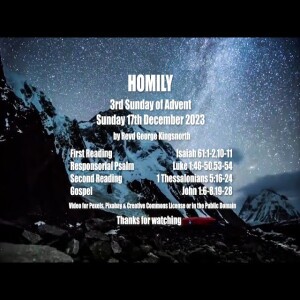
Thursday Dec 14, 2023
Homily - 3rd Sunday of Advent - Sunday 17th December 2023
Thursday Dec 14, 2023
Thursday Dec 14, 2023
Homily3rd Sunday of AdventSunday 17th December 2023Last week, we heard from Mark’s Gospel about John the Baptist preparing the way for the Lord. This week we hear the same story from John’s Gospel. John the Baptist, even says he is the one Isaiah prophesised as being “a voice that cries in the wilderness: Make a straight way for the Lord.” (John 1:23) He had already stated that he was not the Christ, nor was he Elijah, so those quizzing him challenged him for baptising people. John replied he baptised with water, while one who stood among them, he was unfit to undo his sandal-strap was the one, yet they did not know him.Next week, the 4th Sunday of Advent is also Christmas Eve. Christmas is almost upon us. We are running out of time. In Charles Dickens’s A Christmas Carol, Bob Crotchet felt his time was running out to prepare for Christmas, when Old Ebenezer Scrooge made him work right up to the last minute of Christmas Eve, squeezing every bit of time out of his employee to make even more money. It didn’t matter that Bob had a family to go home to, who needed help with their preparations, especially as the family worried this could be Tiny Tim’s last Christmas. They wanted this to be special, as much as they could. Scrooge’s mind was more on the bottom dollar. His god was the crumbly type that could rot away, but he didn’t even know it. Yet, as nightfall came, and the streetlamps were lit, there was much in store to surprise old Scrooge this Christmas Eve night. For he has his own visitors coming, four in total, his old dead boss, Jacob Marley, whose soul was wrapped in chains bound up in his own sins. He had come to warn Scrooge that if he continued his path he was also destined to hell. Mr Marley had come to prepare Scrooge for three special visitors. The spirit of Christmas Past came to show Scrooge his childhood, happier times as an adult but how lust for money had deprived him of his love for Belle. The spirit of Christmas Present came to remind Scrooge what Christmas was all about, a time for Christian charity, being generous, and showing goodwill to everyone. He is shown how life should be, and Scrooge is eager to learn, being humbled by the experience, especially when he sees how Bob Crotchet, though poor, was able to make the occasion special for his wife and family because of the love they had for one another. Scrooge is also informed that unless Bob’s circumstances are changed soon, his son Tiny Tim will not survive.The final visitor is silent, but his appearance has Scrooge quaking in his boots. The Spirit of Christmas Yet to Come brought the most dread, as Scrooge’s potential future was revealed before him. His current course would see him in Hell, bound by the same chains as Jacob Marley, with cash boxes, and ledger books prohibiting him from Heaven because of his selfish ways. His death would be treated either with indifference or with joy by everyone who knew him. For all his earthly wealth, none of it could be taken beyond the grave.Yet, even at this last hour, Ebenezer Scrooge was told there was hope, he could still be redeemed if he could change his ways. Paul’s first letter to the Thessalonians encourages us to be happy always, to be in constant prayer, and for everything give God thanks. The Spirit should be free, and we respect prophesy. We need to consider our actions, mindful of whether good or bad will come of them. If we ask God to guide us, we can guarantee to be kept safe, without blame in our spirit, soul, and body. With God’s Spirit, we can proclaim the Good News to the poor and downhearted. This message will set those bound up to be free again, and our souls, like Blessed Mary, Mother of Our Lord, will be able to rejoice and give glory to God. For indeed, He does marvel for all of us, and if we hold him in awe, his mercy will be for all time. Though we are nothing, he will fill the hungry with good things and send the wealthy away empty. God’s name is Holy, he will give us our daily needs, and forgive us for our failings if we forgive others, he will not let us fall into temptation and will protect us from all evil.There is still time for us to prepare, for we neither know the time nor day Our Saviour will return. We should consider each moment going forward as if He had returned. Our actions going forward should be for good through our charity and love for others. Let our souls Glorify the Lord.Amen.
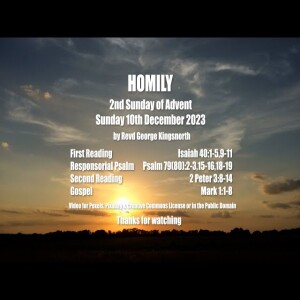
Friday Dec 08, 2023
Homily - 2nd Sunday of Advent - Sunday 10th December 2023
Friday Dec 08, 2023
Friday Dec 08, 2023
Homily2nd Sunday of AdventSunday 10th December 2023Christmas is drawing closer. 10 days have gone by since many started opening the Advent calendar, to reveal treats for children, counting down to Santa Claus coming. Where did it go wrong?We are 15 days away from celebrating the Messiah’s humble arrival as a human child. Born of a Virgin, who in turn sacrificed much to accept her mission to be the mother of Our Lord Jesus Christ. God could have arrived fully grown, but he wanted to have all the same experiences as we do, by coming into the world as a vulnerable child, relying on his human mother, Mary, and adopted father, Joseph. This experience allowed him to communicate with us humans, so as the adult Jesus, he could proclaim the Good News about the Kingdom of God, when his mission would begin some thirty years later, until his death on the cross outside Jerusalem. The human temple of God would be destroyed but raised again three days later. Jesus would on the day of his crucifixion, take on all the sins of the world as a living sacrifice. The one and only sacrifice that would be acceptable to God Our Father for the forgiveness of all our sins.This second Sunday of Advent, we are reminded once more to prepare for Jesus’s arrival. Peter tells us that Our Lord is not slow getting here but is being patient, to give all a chance to be saved. None of his flock should be lost. So, although to the Lord a day is like a thousand years and a thousand years is like a day, it is not to make us suffer but to give us every opportunity to prepare for his Second Coming.Isaiah prophesied about the voice in the wilderness calling to prepare a way for the Lord. Mark starts his Gospel, with a sense of urgency, not with details about Jesus’s birth and childhood, but with Jesus’s cousin John, known as the Baptist, the messenger going before him the prepare the way. Unfit to tie Jesus’s sandals, John proclaimed a baptism of repentance for the forgiveness of sins. He baptised with water but knew Jesus would baptise with the Holy Spirit.So how should we prepare? Bishop of Saginaw, Kenneth Untener, suggested in his 2002 homily for his day, that we think of repentance as rethinking, to look deeply at our lives and how we have fallen away from our love of God. We need to see things differently, to help us to change our ways. All of us, even Jesus, have been tempted. The Devil spends night and day observing us, watching our behaviour to see how he can tap into our blind spots and tempt us away from following God. Unlike Jesus, who never gave in to temptation, we act on how we are being tempted, even though we know it is wrong, and fall into sin. Sin is our consent, “a deliberate act of the human will” (Delany, 1912) to follow through to satisfy ourselves knowing we have done wrong and separated ourselves from God. Fallen from Grace.In our reflection on these deliberate acts, we can see how to “reform our lives” (Untener, 2002) to be more like God, and become Holy. Bishop Untener (2002) suggests we think of sin as a “failure to live up to the gift of (God’s) own Spirit within us”. In the last two weeks before Christmas, he encourages us to acknowledge our sins, not vaguely, but to find a place where you can be alone and say out loud specifically how you have not lived up to the Holy Spirit within you. In the counselling room, it is only by recognising where our lives have gone wrong, by speaking to another person, that we can gain new insights and begin to change our lives. Hearing oneself say the words out loud has a profound effect. This could be your own preparation for going along to the Sacrament of Reconciliation. To confess to a priest, who is not there to judge you but simply to be a witness, as the agent of God, that Jesus is there with you, listening and forgiving you of any sins acted out after baptism (Trese, 2000). Time is short and we must prepare.ReferenceDelany, J. F. (1912). Temptation. [Online]. The Catholic Encyclopedia.. Available at: http://www.newadvent.org/cathen/14504a.htm [Accessed 7 December 2023].Loyola Press. (2023). Second Sunday of Advent, Cycle B. [Online]. Loyola Press. Available at: https://www.loyolapress.com/catholic-resources/liturgical-year/sunday-connection/second-sunday-of-ad [Accessed 7 December 2023].Trese, L. (2000). The Sacrament of Reconciliation: Rising Again to New Life. [Online]. Beginning Catholic. Available at: https://www.beginningcatholic.com/sacrament-of-reconciliation [Accessed 7 December 2023].Untener, K. E. (2002). 2nd Sunday of Advent Year B. [Online]. Visitation North Spirituality Center. Available at: http://www.visitationnorth.org/index.php/year-b-mark/28-second-sunday-of-advent-year-b [Accessed 7 December 2023].Young Catholics. (2023). 2nd Sunday of Advent Year B. [Online]. Young Catholics. Available at: https://young-catholics.com/3060/2nd-sunday-of-advent-year-b/ [Accessed 7 December 2023].
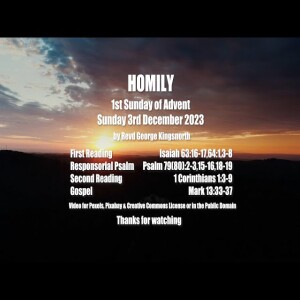
Friday Dec 01, 2023
Homily - 1st Sunday of Advent - Sunday 3rd December 2023
Friday Dec 01, 2023
Friday Dec 01, 2023
Homily1st Sunday of AdventSunday 3rd December 2023As we begin Advent, we enter a new church yearly cycle, Year B. The Gospel theme is about being alert. The owner goes away, leaving his servants to attend his home until his return. The day is unknown. Therefore, the servants must be vigilant, and watchful for the unexpected. He could come out of the blue. Everything must be prepared for the owner’s arrival, leaving everyone anxious. Each is accountable for their duties. Our Lord tells us we must stay awake. (Young Catholics, 2023)Mark’s Gospel was written around AD70, after the failed Jewish rebellion, and the Roman destruction of the Second Temple. Mark’s Gospel Chapter 13 sees Jesus and his disciples leave the Temple. He tells them of its destruction. (Mark 13:2) On the Mount of Olives, the disciples ask Jesus what signs precede the destruction. Jesus warns them not to be lead astray, telling them others would claim to be him but are imposters. The signs include warring nations, earthquakes, and famine. His disciples will be persecuted for proclaiming the Gospel across the planet. Yet, they should not worry about what to say as the Holy Spirit will guide them. Other signs include families fighting and betraying each other, even to death. Those who can hold onto their faith and trust in Jesus would be saved. He tells the disciples of a traumatic time when calamity occurs, foreshadowed by the desolating sacrilege placed where it should not be. A time worse than anything before, cut short by God so his elect can be saved. Jesus warns of false messiahs and prophets, creating signs to deceive and lead people astray. All must be alert. When darkness falls with no sun or moon, and stars tumble from the sky, even heaven will be shaken, “the Son of Man will appear in the clouds’ with great power and glory.” God’s angels will be sent to gather his people from across the earth to the ends of heaven. Many Christians, when Mark’s Gospel was written, believed the Jewish rebellion was the beginning of God’s new Kingdom on earth, when the Messiah would return. With their assumptions dashed, and Christians and Jews being persecuted, Mark tried making sense of the upheaval by exploring the miracles Jesus had performed before his death on the cross. (Mellowes, 1998)Isaiah was with the Jewish people exiled in Babylon. (Hanly, 2008) They sins under various kings had brought God’s wrath on them as Nebuchadnezzar and his Chaldean forces plundered Judah, destroying the first temple, and deporting 10,000 people to Babylon. (Hooker, 1996) The Jews had gone astray. The Second Book of Chronicles, Chapter 36, tells how God sent many messengers, but were rejected. So, he allowed everything in the Temple to be transported to Babylon, for seventy years. (2 Chronicles 36:15-21) Isaiah’s prayer recognised God as ‘Our Redeemer’ and if he came down from heaven the mountains would melt in his presence. He reminds us we are clay by the potter’s hands. King Cyrus of Persia, as prophesied by Jeremiah, was sent to rescue the Judaeans from Babylon, and it was placed in his heart to build the Second Temple in Jerusalem. (Hanly, 2008; 2Chr36:23)As we begin Advent, the past year has been a struggle in one form or another. Much in the world appears dark. War between Russia and Ukraine, the devastation caused by troubles in the Middle East, crazy weather patterns due to global warming, fear of food shortages due to bad harvests, economic worries, the threat of artificial intelligence taking away human jobs, and personal bereavements. All leaving so much uncertainty.The darkness can be depressing, but as Fr Hanly tells us, candlelight can only be appreciated in the dark when its glowing light gives us hope. (Hanly, 2008) Fr Leisy reminds us, that we should not get stressed out waiting for the Lord’s Second Coming but use each day as an opportunity to make the most of our lives. To be closer to Jesus, our preparation can be practicing prayer, celebrating the Sacraments, and being open to serving others, both those close to us and the stranger. (Leisy, 2023)We know not the day, hour, minute, or second when Our Lord Jesus will come in Glory, but likewise, we know not when he will call us from this earthly body. Death, though natural, was brought about by the wages of sin. If we lived in Christ, our death is a sharing in his death, allowing us to share in his Resurrection. (USCC, 1997) Therefore, we have nothing to fear, as St Paul said to the Corinthians, with the gifts of the Holy Spirit, Our Lord Jesus Christ will keep us steady, without blame, as we wait for him to be revealed. This Advent, let what is dormant in your faith be re-energised, as we prepare to celebrate the first coming of our Lord, born of a Virgin Mother, who experienced the world as we do, but without sin, and, some thirty-three years later died for our sins, so we could be forgiven and be Resurrected on the Last Day. (Leisy, 2023) Stay awake.
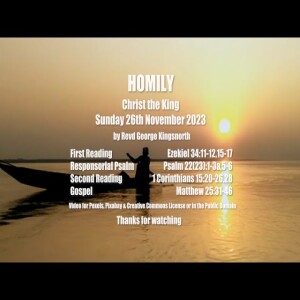
Thursday Nov 23, 2023
Homily - Christ the King - Sunday 26th November 2023 - Year A
Thursday Nov 23, 2023
Thursday Nov 23, 2023
HomilyChrist the KingSunday 26th November 2023This Sunday we celebrate the Solemnity of Christ the King. How familiar are we with the concept of solemnity? This is not a word we often use in everyday life but is frequently used in religious ceremonies. What is Solemnity? Searching through the internet we are provided with a range of meanings, such as being formal, dignified, acting with considerable seriousness, and stately. Funerals are always solemn occasions as we pay respect to those recently deceased. A lot of preparations go into selecting the appropriate readings and gospel to reflect the loved one’s past and the relationships they had with their family, friends, and the community they lived with. We see the same solemnity at the opening of parliament after each general election in most countries. These are state affairs signaling the beginning of a new way of government for a certain set number of years.In many countries around the world, presidents have replaced kings or queens but there are still religious ceremonies conducted when the inauguration of the president occurs. In biblical times there was always a priest such as Samuel who anointed Saul then David when Saul fell out of grace. Zadok anointed Solomon as king. Originally God was the King of the Israelites, but they wanted to be like the rest of the world because they wanted a king to protect them. A human king who often put the people into servitude, losing all the rights that had been given them by God, becoming slaves. The psalm reminds us that the Lord is our shepherd, and we shall want for nothing. We will be fed and watered, our spirits will be revived. He will guide us along the correct path, and no harm will come to us. We will be anointed like kings and have a place to dwell through eternity if we follow Our Lord and King.Ezekiel reminds us that although we may be scattered across the planet, Our Lord knows where we are, and will rescue us. Those who are lost will be found, those injured will be bandaged, and tended to until they are well again. The shepherd knows his flock and knows those who have come to do them harm. On the day of judgment, everyone will be assessed on how they have treated others. In the Celtic Advent by David Cole, there is a story of a young trainee monk, Cuthbert, who was put in charge of hospitality. One cold morning he made his way across the courtyard through the snow, he discovered a traveler who had sought shelter in the monastery. He took the stranger inside; to help warm his freezing feet in hot waters as he waited for fresh bread to be baked in the kitchen. Ensuring the stranger was comfortable, Cuthbert went off to fetch him a loaf. He kept on praying for the man, on his way to the kitchen and back. To Cuthbert’s surprise on his return, he could not find the man. He had vanished. Searching for him, Cuthbert found no tracks in the snow, so was at odds with where he had gone. As he returned inside, he discovered a rich aroma and three heavenly made loaves smelling of lilies, roses, and honey. Cuthbert’s generosity had been rewarded by an angelic visitor. Paul in his letter to the Hebrews reminds us by showing hospitality to strangers, we will unknowingly be entertaining angels.In the Gospel, Jesus separated those who have unknowingly looked after him, when they provided for the stranger, fed, and clothed him or her, or looked after those who have been sick or imprisoned. He solemnly tells us that by recognising those who are seen as the least of us, as if they were our brothers and sisters, we have done the same for him. But those who have not shown the same kindness and ignored those in need around us, because of their neglect, they will be punished. All humans who have ever lived and are still to be born will be judged through their actions towards others and whether they have shown love. Those who have not will be seen as the enemies of Christ.In Paul’s first letter to the Corinthians, he reminds us that it is through Adam, that we all experience death, but through Jesus, we are given life. Until the end of time, Christ will have sovereignty overall. His enemies will be crushed, and death will be destroyed. Jesus’s final act will be to hand back all sovereignty, authority, and power given to him, to God Almighty. Full kingship will return to God so he can be everything in everyone.ReferencesBarron, R. (2023). Solemnity of Christ the King Year A. [Online]. Young Catholics. Available at: https://young-catholics.com/3006/solemnity-of-christ-the-king-year-a/ [Accessed 22 November 2023].Cole, D. (2018). Celtic Advent - 40 days of devotion to Christmas. Abingdon: Bible Reading Fellowship. pp.141Scianna, B. C. (2020). Solemnity of Christ the King Year A. [Online]. The Augustinians. Available at: https://www.augustinian.org/homilies/solemnity-of-christ-the-king-year-a [Accessed 22 November 2023].


